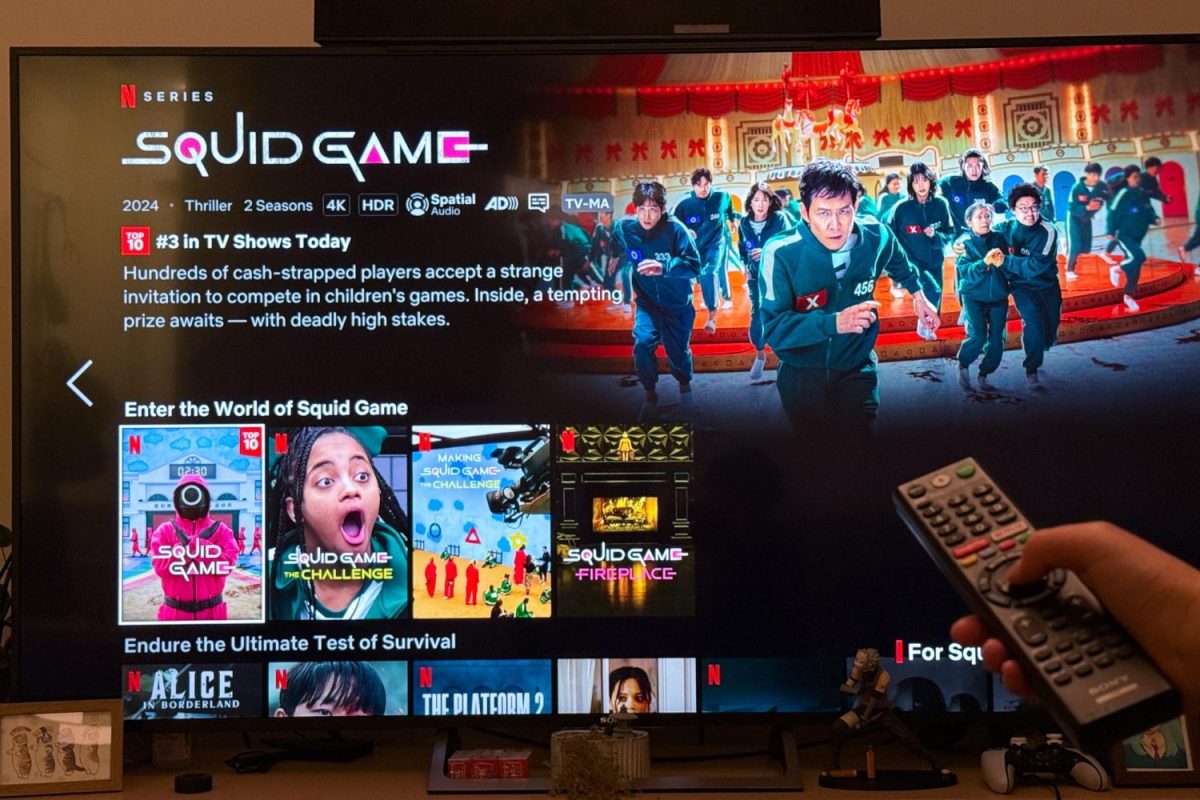The highly-anticipated second season of “Squid Game,” directed by Emmy Award-winning director Hwang Dong-Hyuk, began airing on Dec. 26, 2024.
“Squid Game” has become an international sensation, captivating millions of fans worldwide. The South Korean award-winning series gained a substantial amount of praise, with its first season earning a 95% score on Rotten Tomatoes and its second season receiving a respectable 82%.
“‘Squid Game’ chooses to acknowledge the grayer shades of society that are heavily damaged and engrained with societal expectations,” said Amy Kim, a sophomore at Carlmont who watched both seasons of the series. “The show highlights the people of Korea who work their socks off to make ends meet, which is a different and more human perspective than the idealistic world of stereotypical Korean dramas.”
Fans around the world wasted no time watching the entire season after three years of waiting, effectively making it second in the Top 10 most popular non-English shows on Netflix, according to Tudum, an official website by Netflix dedicated to fans.
The second season of “Squid Game” picks up where the first left off, following Seong Gi-Hun, the main protagonist and Player 456, as he becomes determined to put an end to the brutal death games. He teams up with Hwang Jun-Ho, the police officer who infiltrated the games in Season 1, and a small group of allies to uncover the secrets behind the deadly games and those who run them.
As part of their plan, Seong was meant to infiltrate the games with a tracker implanted in his tooth. However, upon arrival, he discovers that the tracker has been removed, leaving him to once again fend for himself in a series of brutal children’s games. The prize remains at 45.6 billion Korean won, which amounts to roughly $31 million.
Season 2 introduces a myriad of new characters, each with their own motivations and backstories that further drive the underlying theme of class and societal struggle in “Squid Game.” The new season also introduces a new game mechanic, in which players can choose to either leave the game and split the existing prize money, or continue playing for a larger prize.
“I thought the voting was very interesting,” said Katelyn Yee, a sophomore at Carlmont. “It really helped the suspense because I was on the edge of my seat every time they were voting to continue or end the games. It also made me really frustrated because I could feel the betrayal that the players felt when their friends voted to continue.”
This sense of desperation and betrayal is a recurring theme in “Squid Game,” demonstrating the lengths that people will go to when blinded by greed and faced with financial hardship.
“The desperation for wealth and financial stability shown by the characters in ‘Squid Game’ show a hungrier, darker side of society in Korea,” Kim said.
Despite the show’s successful portrayal of lower-class dynamics, many viewers felt a weaker emotional connection to the characters in Season 2 compared to Season 1.
“I had much more of an emotional connection to the characters in Season 1,” Yee said. “I cried in Season 1 during a lot of the character deaths, but I didn’t really feel the same way about any of the character deaths in Season 2. I was definitely sad about them, but it just didn’t hit the same.”
In addition to the slight flaws in character writing, many viewers were also unhappy with the pacing and ending of the second season.
“The pacing felt a bit abrupt because there wasn’t much buildup to certain events,” Yee said. “The ending also left me really frustrated, because so many things went unexplained.”
One aspect that “Squid Game” excelled at, however, was its cinematics and visuals. The deliberate use of lighting, color, and dynamic camera angles added to the suspense and thrill of each scene.
“One of the things I enjoyed the most was the set design and how they shot a lot of the scenes,” Yee said. “In the third game of the season, mingle, they would use darker lighting paired with strobe lights and quick shots when the players were running to the room, which made you feel really immersed in the anxiety that the players probably felt in that moment.”
“Squid Game” has also played a large part in introducing global audiences to Korean culture. Many people worldwide became interested in the games featured in the series after watching it.
“I think ‘Squid Game’ has definitely exposed more people to Korean culture,” said Jasmine Gee, the president of the Korean Pop Culture Club at Carlmont. “I’ve seen a lot of people try to make the dalgona from Season 1 at home, along with the lunch boxes that they ate in between the games.”
Through its portrayal of traditional Korean games and customs, “Squid Game” has sparked a newfound global curiosity about South Korean culture.
“Gonggi is a game that consists of either pebbles or small, plastic pieces, which are usually a spherical or octagonal prism shape,” Kim said. “A player will pick these pieces up one by one, throwing them and catching them in their hand. This continues until they have all the pieces in their hand, after which they will throw up all the pieces and try to catch them by balancing all the pieces on their knuckles.”
Beyond its captivating narrative and striking visuals, “Squid Game” has played a significant role in introducing global audiences to Korean culture. From its depiction of traditional childhood games to its portrayal of iconic snacks and meals, the series has sparked a newfound curiosity about Korea’s rich traditions.
“‘Squid Game’ is really interesting to watch, despite some parts being a bit gory,” Gee said. “It’s a great way to make viewers interested in Korean culture because they see certain aspects of it within the show and become curious about it.”












